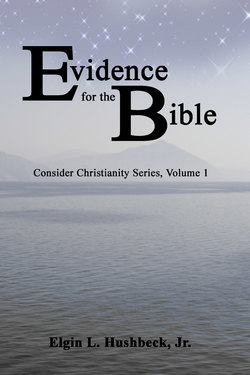Читать книгу Evidence for the Bible - Elgin L Hushbeck Jr. - Страница 12
На сайте Литреса книга снята с продажи.
The Canon of the Old Testament
ОглавлениеThis still leaves the question as to why the particular books that now appear in the Bible are in there, while others are not. Once again, charges are made that it was at one of those infamous councils that the leaders of the church got together and put in all the books they liked while rejecting all the books they didn’t agree with. As with the other charges, these also lack evidence to support them.
When Jesus quoted from the Old Testament, he did not base his arguments on the strength of a council’s decision. It is very clear from the way that Jesus spoke of the books of the Old Testament that he considered them to be the inspired words of God.11 As the inspired words of God, they were authoritative, and belonged to the canon of Scripture the moment they were written. While this may explain why these books belong in the Old Testament, it still leaves the question of how these books were determined to be inspired.
In their book, A General Introduction to the Bible,12 Norman Geisler and William Nix cite five principles that were used to test whether or not a book was inspired by God. To be considered inspired, a book must have been written by a man of God. It should be confirmed by an act of God, by a miracle or prophecy. It should be in agreement with other writings of God in its teachings. It should have the power of God, that is, it should have an impact on people’s lives. And lastly, it should be accepted and used by God’s people.
As for the Old Testament, the canon was determined by the Jewish people themselves. While the exact time at which the canon became settled is unknown, it seems to have been early and done by consensus. The five books of Moses were certainly considered to be Scripture from the time they were written, and references to them as authoritative can be found throughout the Old Testament.13 Most of the prophets were probably accepted at the time they were written or shortly thereafter. The prophet Jeremiah, writing before the fall of Jerusalem in 586 B.C., speaks of prophets that God had sent earlier (Jeremiah 7:25). Daniel, who wrote during the exile,f states that he “understood from the Scriptures, according to the word of the LORD given to Jeremiah the prophet” (Daniel 9:2).
By the time of Christ, the canon of the Old Testament was settled. This can be seen in the works of Flavius Josephus, a Jewish historian who wrote in the later part of the first century. Josephus wrote that:
. . . every one is not permitted of his own accord to be a writer, nor is there any disagreement in what is written; they being only prophets that have written the original and earliest accounts of things as they learned them from God himself by inspiration; and others have written what hath happened in their own times, and that in a very distinct manner also. For we have not an innumerable multitude of books among us, disagreeing from and contradicting one another [as the Greeks have], but only twenty-two books, which contain the records of all the past times; which are justly believed to be divine.14
The 22 books mentioned by Josephus are the same as the 39 books we have in the Old Testament today. The reason for the difference in the two numbers is that Josephus counted some books as a single book, whereas today we count them as two or more. For example, the twelve minor prophets were counted as one book since they were kept together on a single scroll. The books of Samuel, Kings, and Chronicles were also counted by Josephus as single books, whereas in our modern Bibles each of these have been divided into two books.
After the destruction of the temple in A.D. 70, a need was seen by many Jewish leaders to formally establish the canon of the Old Testament. With the temple gone, the Hebrew Scriptures were to become the center of the Jewish faith. So the Jewish leaders met in the city of Jamnia in A.D. 90. The books that they choose were the same as those mentioned earlier by Josephus, and the same that we have in our Bibles today. The discussions at Jamnia centered around just a few books such as Esther and the Song of Songs. Most of the books of the Old Testament were accepted without any question. Rather than pick and choose those books that best suited them, the Jewish leaders simply ratified those books that were already accepted by the Jewish people as the Word of God. They did not add or remove any books.
